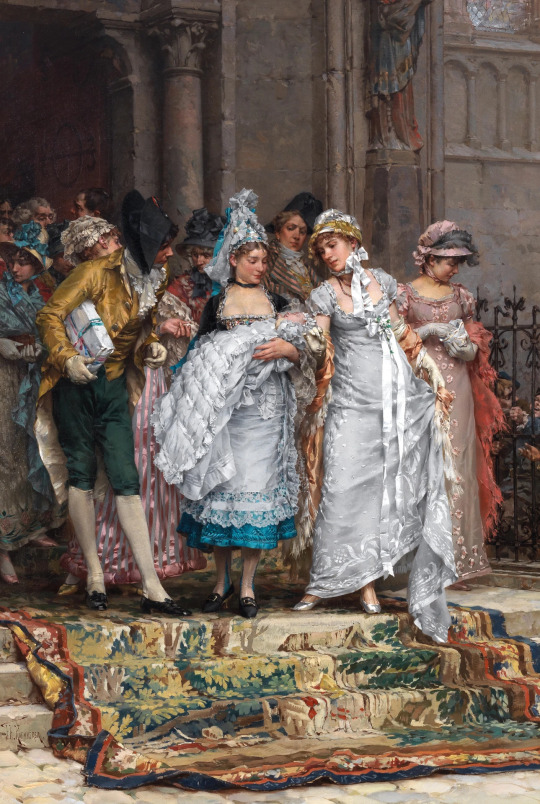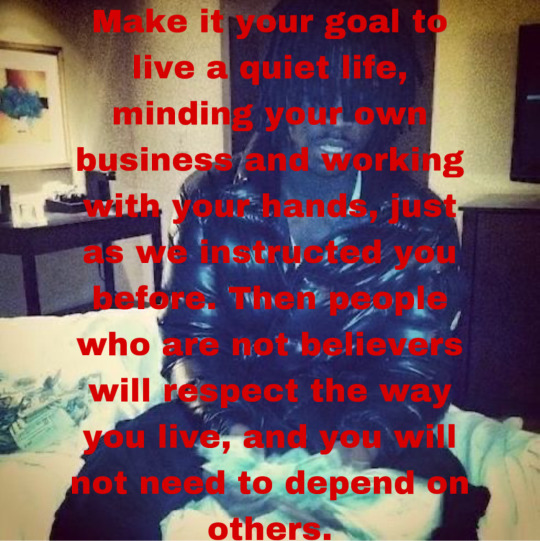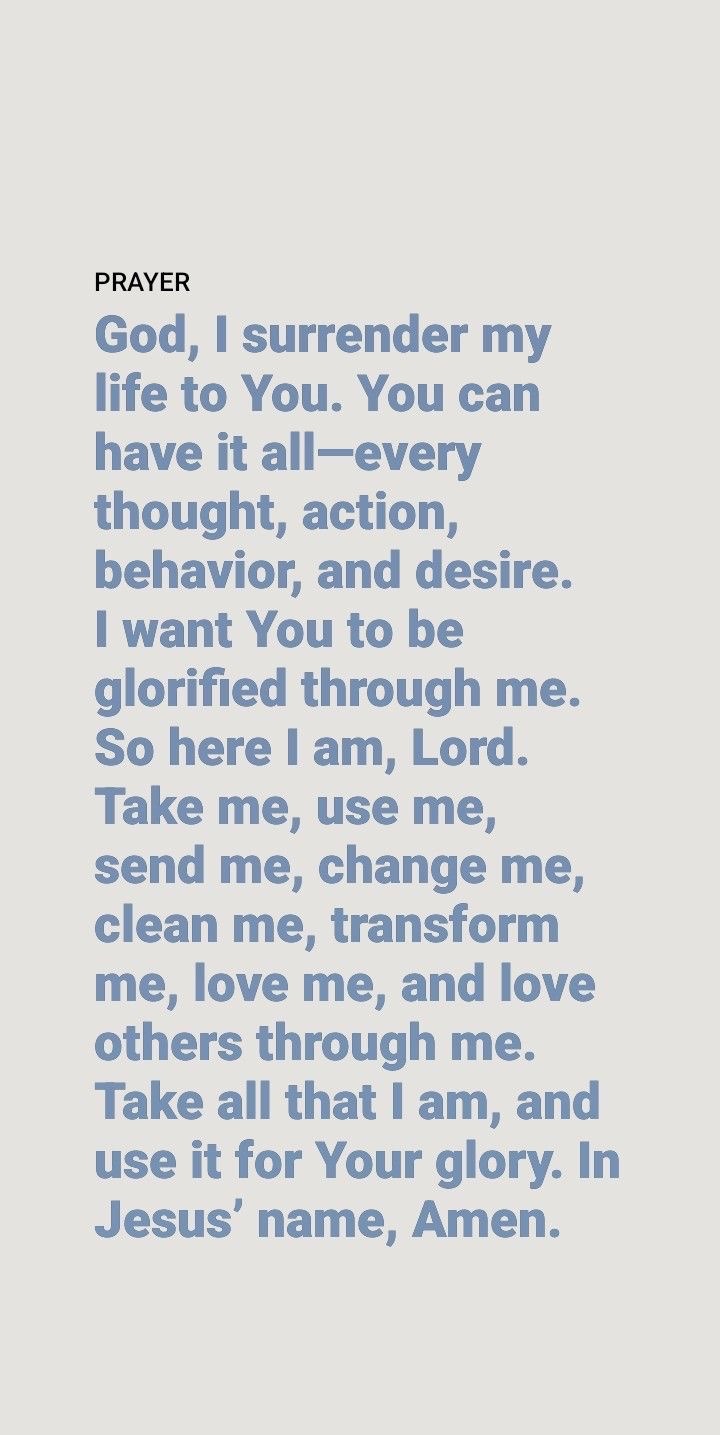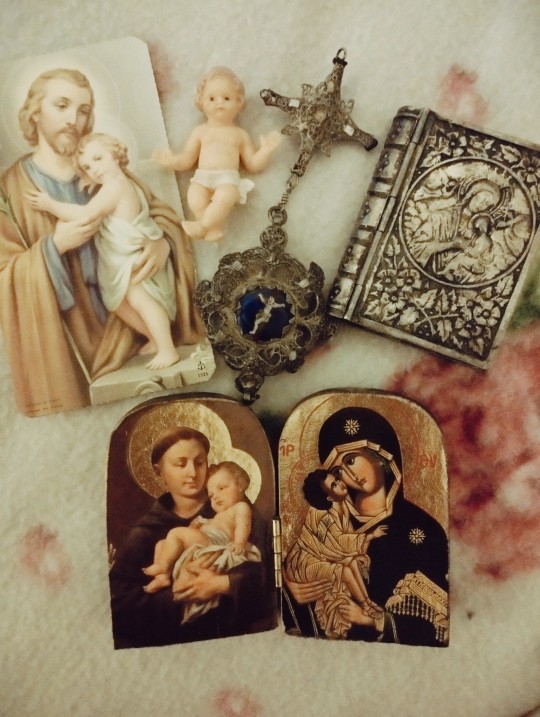#chrisitanity
Text

Thank You God Always 🤍
#god#jesus#christ#christian blog#lord#love#prayer#faith#pray#jesus christ#bible#trust#grateful#chrisitanity#christian#christianity#life#blessed#blessings#church
3K notes
·
View notes
Text
Trad Husbands
Traditional Husbands also have a huge part to play in a traditional marriage, although it’s not acknowledged by many of traditional individuals. So here’s a small list of the traditional husbands duties :
Make your wife feel protected, whether she’s with you or not.
Do the heavy lifting and fixing jobs around the house for your wife.
Always greet your wife with a kiss
Set an example to your daughter/s what a boyfriend should be like, and your sons how they should treat women.
Always bring gifts back from long work trips to show your loyalty and appreciation.
Make sure to remind your wife that you love her by taking her on dates, saying “i love you” frequently and holding her when she needs it.
Cater to her emotional and physical needs, like she does for you.
Give her days or time off, especially during pregnancy, birthdays and holidays in general.
This relationship is a balance, she looks good for you so make sure you’re hygienic and groomed for her.
Assure her consistently that she and her kids are completely provided for and protected as long as you live.
Support her in everything she does.
Women are a lot more emotional then their male counterparts so approach arguments and conflicts with caution and care.
Make sure you understand her boundaries and what she considers wrong etc, otherwise you’ll run into many arguments ( and obviously abide by these boundaries ).
Never talk badly to others about your wife. Even to your own parents and children.
This list isn’t all the duties of a traditional working husband, just a small guide. Although men and women aren’t equals, within a relationship it’s a balance. We have to work toward that balance by showing we have equal yet opposing duties.
#tradwife#traditional gender roles#traditional wife#femininity#traditional femininity#traditionalism#anti feminst#feminine#patriarchy#tradition#feminism#homemaker#anti feminist women#homemaking#housewife#pro patriarchy#masculinity#domestic discipline#chrisitanity#female
1K notes
·
View notes
Text
My already great respect for my father went up tenfold today when he started his sermon with “Before we get started this morning, we have to address the elephant in the room: the eclipse. What is it? What does it mean? I’m gonna tell you two things: first, it’s the moon moving in front of the sun, and second, a wicked and perverse generation seeks a sign. RELAX!”
#HONESTLY the amount of ‘Christian’ fearmongering I’ve seen on instagram is ridiculous#YOU’RE MAKING US LOOK BAD#chrisitanity
67 notes
·
View notes
Photo

Frederik Hendrik Kaemmerer (Dutch, 1839-1902)
The Christening, n.d.
#different colour and quality#Frederik Hendrik Kaemmerer#dutch#dutch art#the christening#christening#art#fine art#fine arts#classical art#chrisitanity#baptism#oil painting#traditional art#european art#europe#europa#1800s
326 notes
·
View notes
Text

#mine#my shelves#crosses#religion#toys#dolls#dollcore#deer#fawn#collection#figurine#kidcore#chrisitanity#my photos#vintage#living room
166 notes
·
View notes
Text

66 notes
·
View notes
Text

“If you have men who will exclude any of God's creatures from the shelter of compassion and pity, you will have men who will deal likewise with their fellow men.”
St. Francis of Assisi, pray for us!
#catholic#chrisitanity#saints#catholic saints#st francis of assisi#saint francis of assisi#francis of assisi#my art#pixel art
113 notes
·
View notes
Text
Happy Easter!
May your day be filled with positive interactions and lovely food!
And remember.. if things get tough… having a lie down for three days then getting up and handling your shit worked for Jesus so it can work for you too.
#christian witch#witch#witchcraft#pagan#wicca#christian witchcraft#wiccan#paganism#christianity#the lord my god#witchblr#christopagan#christopaganism#green witch#christian life#chrisitanity#christian living#jesusislord#belief in jesus#easter
78 notes
·
View notes
Text

1 Thessalonians 4:11
#God#catholic#catholic stuff#chrisitanity#jesus christ#bible verse#verses#bible#bible quote#bible study#bible reading
7 notes
·
View notes
Text
“Live in the world as if only God and your soul were in it; then your heart will never be made captive by any earthly thing.”
- St. John of the Cross
80 notes
·
View notes
Text

#god#jesus#christ#christian blog#lord#love#prayer#faith#pray#jesus christ#bible#trust#grateful#chrisitanity#christian#christianity#life#blessed#blessings#church
853 notes
·
View notes
Text
We need more “tradwife” pages that speak on the duties and roles in a traditional relationship instead of ones that spew out pictures of an unrealistic family life. I love those pages as well, don’t get me wrong, but they don’t show much realism and make people believe the traditional community is delusional. We need more accounts that speak on the subject in itself and educate the people who need it. Traditional people want to spread the message that being traditional is ideal and beautiful but constantly showing the unrealistic expectations of this lifestyle deters average people from liking it completely. Simply because most arguments against this lifestyle are cases like domestic abuse and financial consequences but if we shown that we acknowledge these things and how to prevent them in this dynamic, people will start to understand why we cherish these family, and individual, values.
#tradwife#traditional gender roles#traditional wife#femininity#traditional femininity#traditionalism#anti feminst#feminine#patriarchy#tradition#feminism#homemaker#anti feminist women#homemaking#housewife#pro patriarchy#masculinity#domestic discipline#chrisitanity#female
126 notes
·
View notes
Note
if your close friend came out as lgbt to you would you distance yourself from them because of your religion?
Not related to the other thing but an interesting question! The answer is no- I have plenty of non-Christian friends and friends who are part of the LGBTQ+ community. Distancing myself just because they are living a way my beliefs don’t agree with wouldn’t be showing them the love of God. Now, distancing yourself because someone is being destructive and you find you need to set that boundary is another thing.
Actually, years ago when I was part of another community I was part of a fairly tight nit group and one of my friends came to me first to tell me he was gay and even though most of the others in that group have moved on and gotten out of art he and I still talk fairly often! Helped each other through a lot- love ya V!
11 notes
·
View notes
Text
quick little vent about stuff
But I’m I the only one who gets frustrated when people hate on queer Muslims? I mean I know I’m technically not a Muslim (I’m a pagan) but it’s very frustrating when they act like being gay is a choice since it shown to be not a choice.
like people who hate on gay Muslims have you guys not research how the brain works? Literally BILL NYE the guy who did science education explains it we can’t control being lgbtq even if we wanted to be straight we can’t! We just end up hurting ourselves and making ourselves feel unhappy
I sometimes even see lgbtq people who stop being muslims still get hated! honestly seeing lgbtq muslims being hated reminds me of how the Christians hate on lgbtq people especially christians who are lgbtq
also to quickly mention we don’t really know the original text for everything like it’s been confused if the Bible part where it says “men shall not sleep with men” bit was translated wrong or not so but I could be wrong but even if I was it doesn’t mean you have to be rude about it
look I maybe just being harsh or hell maybe some call stupid but I am a personally believe that if it doesn’t effect you or the person then just let them live their lives
I already know I may get hate comments but I am just stating my opinion and if there is any lgbtq Muslims out there who are scared just know just be you even if everyone acts hateful and towards you just be yourself and I’m glad or well hope your happy being just the way you are cause your being yourself and not hurting anyone that’s all that matters you deserve to be happy and I’m sure your god if it’s allah Jesus or whoever respects and loves you for being who you are even if people say shit to you be yourself
anyways that’s all for now
Just remember this is my opinion I am not looking for drama I’m just giving out my opinion and not looking for a fight anyways see ya
#tw vent#tw reglion#tw homophobia#muslim#queer muslims#Tw reglious trauma#chrisitanity#tw hate#tw venting#tw rant#vent post#just my thoughts#just my opinion
9 notes
·
View notes
Note
You asked me a question now I get to ask you one. (Though of course only answer If you want to). What drew you to Eastern Orthodoxy? Why have you chosen to be catechized? Also book recs on orthodoxy if you have any?
What drew me to Orthodoxy? Glad you asked. Here's a list of reasons I'm Orthodox (most of them are copied and pasted from a previous post I did on this).
The New Perspective on Paul, a view in New Testament Studies that says that Paul did not teach justification by faith alone, only that "works of the law" (circumcision, kosher, observing Jewish festivals, etc.) are useless for salvation. It resolves all conflicts between Paul ("For we hold that one is justified by faith apart from the works of the law") and James ("You see how a person is justified by works and not by faith alone"), resolves apparent contradictions within Paul (say, the already quoted Romans 3:28 and 2 Corinthians 5:10 - "For we must all appear before the judgment seat of Christ, so that each one may receive what is due for what he has done in the body, whether good or evil") and explains why both use Abraham as the centrepiece of their cases (Abraham lived before the Law). In other words, a theory of justification that omits the tangles of Protestantism ("James is about a different kind of faith", "Good works come from justification without contributing to it", etc.). While it's a Protestant point of view, it's pretty much what Catholicism and Orthodoxy have always taught - it's only "New" to Protestants.
For a long time, C. S. Lewis has been my favourite writer; his theology is way deeper and more coherent than the Evangelical theology I was raised on. And having read more of both, it's almost uncanny how similar Lewis' theology and Orthodoxy are. For example, Orthodoxy teaches that you can't draw up "sin lists" the way Catholics do or definitively divide them between venial and mortal. And C. S. Lewis: "You complain that my last letter does not make it clear whether I regard being in love as a desirable state for a human or not. But really, Wormwood, that is the sort of question one expects them to ask! Leave them to discuss whether "love", or patriotism, or celibacy, or candles on altars, or teetotalism, or education, are "good" or "bad". Can't you see there's no answer? Nothing matters at all except the tendency of a given state of mind, in given circumstances, to move a particular patient at a particular moment nearer to [God] or nearer to us." (The Screwtape Letters, written as a demon writing letters to another). And Orthodoxy teaches salvation-as-deification (although for us, it's taking on God's energies rather than His essence). And Lewis: "We are to be re-made. All the rabbit in us is to disappear - the worried, conscientious, ethical rabbit as well as the cowardly and sensual rabbit. We shall bleed and squeal as the handfuls of fur come out; and then, surprisingly, we shall find underneath it all a thing we have never yet imagined: a real Man, an ageless god, a son of God, strong, radiant, wise, beautiful, and drenched in joy." ("Man or Rabbit" from God in the Dock). I could go on, but this point is already too long.
The Orthodox theory of theosis, that salvation is our relationship with God and is a process of becoming like Him that befits us for eternity with Him. It's a wonderfully elegant theory that unites salvation, faith, good works, our relationship with God and Heaven into one. Again, far less tangled than Protestantism.
The exclusion of the Deuterocanonical Books (Tobit, Sirach, Judith, etc.) looks more unjustifiable with every glance I take at it. Yes, they're not in the Hebrew Bible, but neither is the entire New Testament. Yes, Jerome said they were "not to establish any doctrine" but most of the Fathers disagreed and said so at the 393 Synod of Hippo. Yes, they're never quoted in the New Testament, but I don't think non-quotation demonstrates non-canonicity because quotation does not demonstrate canonicity - Paul quoted pagan authors (Acts 17:28, 1 Corinthians 15:33) and Jewish traditions (2 Timothy 3:8) and Jude quoted extracanonical Jewish works (:9 and :14-15).
Sola scriptura requires that Scripture is perspicuous, when to me the great multitude of denominations shows that it's not. That's why we have Church Tradition, to sort out the ambiguities in Scripture.
Orthodoxy has generally been more accepting of allegorical readings of Genesis 1-11 than Catholicism and especially conservative Protestantism. The fact is that the Human Genome Project shows that the human race did not originate with a couple in the Middle East in 4004 BC, but with a population of several thousand in East Africa 300,000 years ago. And since nature was made by the same God who made Scripture, who knows all, cannot lie and never changes His mind, and science is the systemic study and analysis of nature, we cannot dismiss sound science we don't like or find inconvenient any more than sound theology we don't like or find inconvenient. And what I've described is not some atheist plot - the director of the Human Genome Project, Francis Collins, is an Evangelical who has written apologetics.
Relatedly, why do you read a Bible with, say, James, Hebrews and 2 Peter and without, say, the Didache or the Shepherd of Hermas or the Apocalypse of Peter? The judgement of the Church. So there are two options I think you can take. Either the Bible is malleable (and thus not much of an infallible authority) or the Church is also an infallible authority.
Martin Luther was the Charles Taze Russell (that's the guy who founded the Jehovah's Witnesses) of the 16th century, complete with insertions to and omissions from the Bible, with a side order of rabid antisemitism.
Which is more likely to be the closer to the original - a 1700-or-more (Nicaea was in 325)-years-old group that makes a point of tracing an unbroken line as far back as possible or a 500-or-less-(the Reformation began in the 16th century, but most extant Protestant groups are significantly younger) years-old constellation of groups that make a point of questioning Tradition?
Jesus instituted the Eucharist (Mark 14:22-25, Matthew 26:26-29, Luke 22:14-20) and Baptism (Matthew 28:19), gave rules for dealing with sin in the Church (Matthew 18:15-20), gave His Disciples spiritual authority and appointed them as ministers (John 20:21-23 especially) and explicitly established a church (Matthew 16:18). What did He never do? Establish a Biblical canon. So why are we declaring the Bible to be the judge of the Church?
I want to have a physical faith - one that reminds us of Christ's presence and power with icons and priests and beautiful worship spaces. As C. S. Lewis said, "It is no use trying to be more spiritual than God. God never meant for man to be a purely spiritual creature. That is why He uses material things like bread and wine to put the new life into us."
Most historians agree that Papal supremacy was a relatively late institution, and that the early Church was run by a confederation of local church leaders with no clear head - which is exactly what Orthodoxy teaches.
In terms of leaving Evangelicalism specifically, I learnt that a lot of what I thought Catholics believed - Scripture as not the sole authority, infant baptism, ornate churches, Liturgy, the Real Presence of Christ in the Eucharist, Jesus' descent into Hell/Hades - was just what Christians believed until c.200 years ago and what Methodists, Anglicans and Lutherans believe now.
The Didache is a church manual written in 50-110 AD, and specialists prefer earlier dates of 50-70 AD. For perspective, Paul died in 63 AD and Revelation was written in 95 AD. This is a book describing a church service in the time (or at least the living memory) of the Apostles. And it describes a very Orthodox mode of worship: set prayers for Communion, daily prayers (the Lord's Prayer three times a day), a church run by bishops, priests and deacons, referring to Communion as a sacrifice, fasting on Wednesdays and Fridays.
As for catechesis, it's necessary to join Orthodoxy. There are a few reasons for this. First and most obviously, to ensure that new converts know what they're converting to. Secondly, to ensure that new converts are willing to persist in becoming Orthodox. Thirdly, because the cultivation of an Orthodox way of thinking about the world (a phronema, we call it) is an important part of becoming Orthodox, we think there's value in making new members take a while to become Orthodox.
My Orthodox reading has been mainly online, from the parish websites of St. John the Evangelist Orthodox Church and St. Andrew's Orthodox Cathedral. If it's books you want, I can also recommend The Orthodox Church: An Introduction to Eastern Christianity by Timothy Ware.
9 notes
·
View notes
Text

45 notes
·
View notes